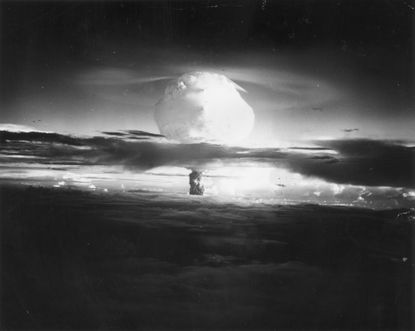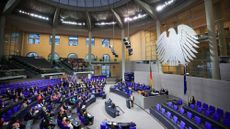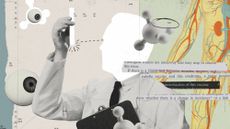Trump is planting the seeds for a new age of nuclear terror
By withdrawing the U.S. from the INF Treaty with Russia, Trump is giving us new cause to worry about the end of the world


There was a time in our recent history when Americans continually expected and prepared to die in cataclysmic radioactive fire — and accepted that shadow over their lives as the price of freedom.
Duck-and-cover drills. Bomb shelters. The Cuban Missile Crisis. Dr. Strangelove. Able Archer 83. War Games. Whether in real or imagined settings, humanity spent much of the Cold War contemplating the use of nuclear weapons, stepping far too close at times to the end of the world.
It was a terrifying way to live. Naturally, President Trump seems determined to bring about its restoration.
Subscribe to The Week
Escape your echo chamber. Get the facts behind the news, plus analysis from multiple perspectives.

Sign up for The Week's Free Newsletters
From our morning news briefing to a weekly Good News Newsletter, get the best of The Week delivered directly to your inbox.
From our morning news briefing to a weekly Good News Newsletter, get the best of The Week delivered directly to your inbox.
To be fair, the president's announced decision to withdraw the United States from the INF Treaty with Russia makes a certain amount of sense. The treaty bans short- and medium-range nuclear weapons; Russia has apparently been in violation for years. What's the point of sticking with a bad deal?
But Trump isn't just walking away from one bad deal — he's reversing the work of a generation of American leaders who advocated drawing down, not building up, the world's nuclear forces. The INF Treaty was an important symbol of that commitment. The president, whose bigger-is-better beliefs about power have long been his calling card, is recommitting the United States to the logic of nuclear terror.
Trump's decision comes just a few weeks before the 35th anniversary of The Day After, an ABC television movie that depicted a nuclear attack on my adopted hometown of Lawrence, Kansas. The star-studded film — it featured Jason Robards, John Lithgow, Steve Guttenberg, and JoBeth Williams — started with fire and ended bleakly, with Lithgow's character trying fruitlessly to contact the outside world. "Hello? Is anybody there? Anybody at all?"
A reported 100 million people watched the broadcast in November 1983, most of them stunned. Among those frightened by the world it depicted? President Ronald Reagan, who had received a preview a few weeks earlier.
"I ran the tape of the movie ABC is running on the air Nov. 20," he wrote in his diary. "It's called The Day After. It has Lawrence, Kansas, wiped out in a nuclear war with Russia. It is powerfully done — all $7 mil. worth. It's very effective & left me greatly depressed. So far they haven't sold any of the 25 spot ads scheduled & I can see why. Whether it will be of help to the 'anti nukes' or not, I can't say. My own reaction was one of our having to do all we can to have a deterrent & to see there is never a nuclear war."
Nobody's ever drawn a straight line from The Day After to the INF Treaty, but what we know is this: A few years after the movie aired, Mikhail Gorbachev, a young reformer, came to power in the Soviet Union. Reagan and Gorbachev met in Reykjavík, Iceland, in 1986 and came close to an agreement eliminating all nuclear weapons. That didn't work out, but in 1987 they signed the INF Treaty.
The moment was extraordinary. After decades of proliferation — there were more than 60,000 nuclear weapons in the world in the late 1980s — the numbers started to come down, and have continued to do so since, to fewer than 10,000 warheads today.
It feels necessary to tell this story, because there are generations of Americans alive now who never lived so palpably with the expectation of imminent apocalypse — and others who look at history and decide that Reagan was a tough-guy cowboy who forced the Russians to back down. Neither group may understand what so many of us feel in our gut: Every new weapon is a step closer to disaster.
Until recently, that idea was commonly accepted. Former President Barack Obama haltingly committed the U.S. to a long-term pursuit of zero nukes; the idea was endorsed by high-ranking former officials like former Secretaries of State George Shultz and Henry Kissinger.
"Reassertion of the vision of a world free of nuclear weapons and practical measures toward achieving that goal would be, and would be perceived as, a bold initiative consistent with America's moral heritage," Shultz and Kissinger wrote with other co-authors in a 2007 Wall Street Journal op-ed.
Trump, of course, has proven to have little use for America's "moral heritage." And while he justifies his action because of Russia's treaty violations, it's difficult to avoid the sense that he wants a nuclear buildup to be part of his own legacy: Pulling out of the INF frees the U.S. to start developing those short- and medium-range weapons again.
"We'll have to develop those weapons," the president told reporters in Nevada. "We're going to terminate the agreement and we're going to pull out."
For those opposed to Trump's move, the equation is simple: The more weapons that exist, the more likely it is one will be used. If even one is used, it is much more likely that others will be used. It's difficult to envision a "limited" nuclear war. The logic of deterrence has always been that such weapons, once used, will lead to a full-scale conflict. Why would anybody gamble on the possibility?
"A nuclear war cannot be won and must never be fought," Reagan said in his 1984 State of the Union address. "The only value in our two nations possessing nuclear weapons is to make sure they will never be used. But then would it not be better to do away with them entirely?"
Trump doesn't follow such logic. He instead is planting the seeds for a new age of nuclear terror. New generations of Americans — and people all around the globe — have new cause to worry about the end of the world. The shadow has returned.
Sign up for Today's Best Articles in your inbox
A free daily email with the biggest news stories of the day – and the best features from TheWeek.com
Joel Mathis is a writer with 30 years of newspaper and online journalism experience. His work also regularly appears in National Geographic and The Kansas City Star. His awards include best online commentary at the Online News Association and (twice) at the City and Regional Magazine Association.
-
 Will California's EV mandate survive Trump, SCOTUS challenge?
Will California's EV mandate survive Trump, SCOTUS challenge?Today's Big Question The Golden State's climate goal faces big obstacles
By Joel Mathis, The Week US Published
-
 'Underneath the noise, however, there’s an existential crisis'
'Underneath the noise, however, there’s an existential crisis'Instant Opinion Opinion, comment and editorials of the day
By Justin Klawans, The Week US Published
-
 2024: the year of distrust in science
2024: the year of distrust in scienceIn the Spotlight Science and politics do not seem to mix
By Devika Rao, The Week US Published
-
 US election: who the billionaires are backing
US election: who the billionaires are backingThe Explainer More have endorsed Kamala Harris than Donald Trump, but among the 'ultra-rich' the split is more even
By Harriet Marsden, The Week UK Published
-
 US election: where things stand with one week to go
US election: where things stand with one week to goThe Explainer Harris' lead in the polls has been narrowing in Trump's favour, but her campaign remains 'cautiously optimistic'
By Harriet Marsden, The Week UK Published
-
 Is Trump okay?
Is Trump okay?Today's Big Question Former president's mental fitness and alleged cognitive decline firmly back in the spotlight after 'bizarre' town hall event
By Harriet Marsden, The Week UK Published
-
 The life and times of Kamala Harris
The life and times of Kamala HarrisThe Explainer The vice-president is narrowly leading the race to become the next US president. How did she get to where she is now?
By The Week UK Published
-
 Will 'weirdly civil' VP debate move dial in US election?
Will 'weirdly civil' VP debate move dial in US election?Today's Big Question 'Diametrically opposed' candidates showed 'a lot of commonality' on some issues, but offered competing visions for America's future and democracy
By Harriet Marsden, The Week UK Published
-
 1 of 6 'Trump Train' drivers liable in Biden bus blockade
1 of 6 'Trump Train' drivers liable in Biden bus blockadeSpeed Read Only one of the accused was found liable in the case concerning the deliberate slowing of a 2020 Biden campaign bus
By Peter Weber, The Week US Published
-
 How could J.D. Vance impact the special relationship?
How could J.D. Vance impact the special relationship?Today's Big Question Trump's hawkish pick for VP said UK is the first 'truly Islamist country' with a nuclear weapon
By Harriet Marsden, The Week UK Published
-
 Biden, Trump urge calm after assassination attempt
Biden, Trump urge calm after assassination attemptSpeed Reads A 20-year-old gunman grazed Trump's ear and fatally shot a rally attendee on Saturday
By Peter Weber, The Week US Published